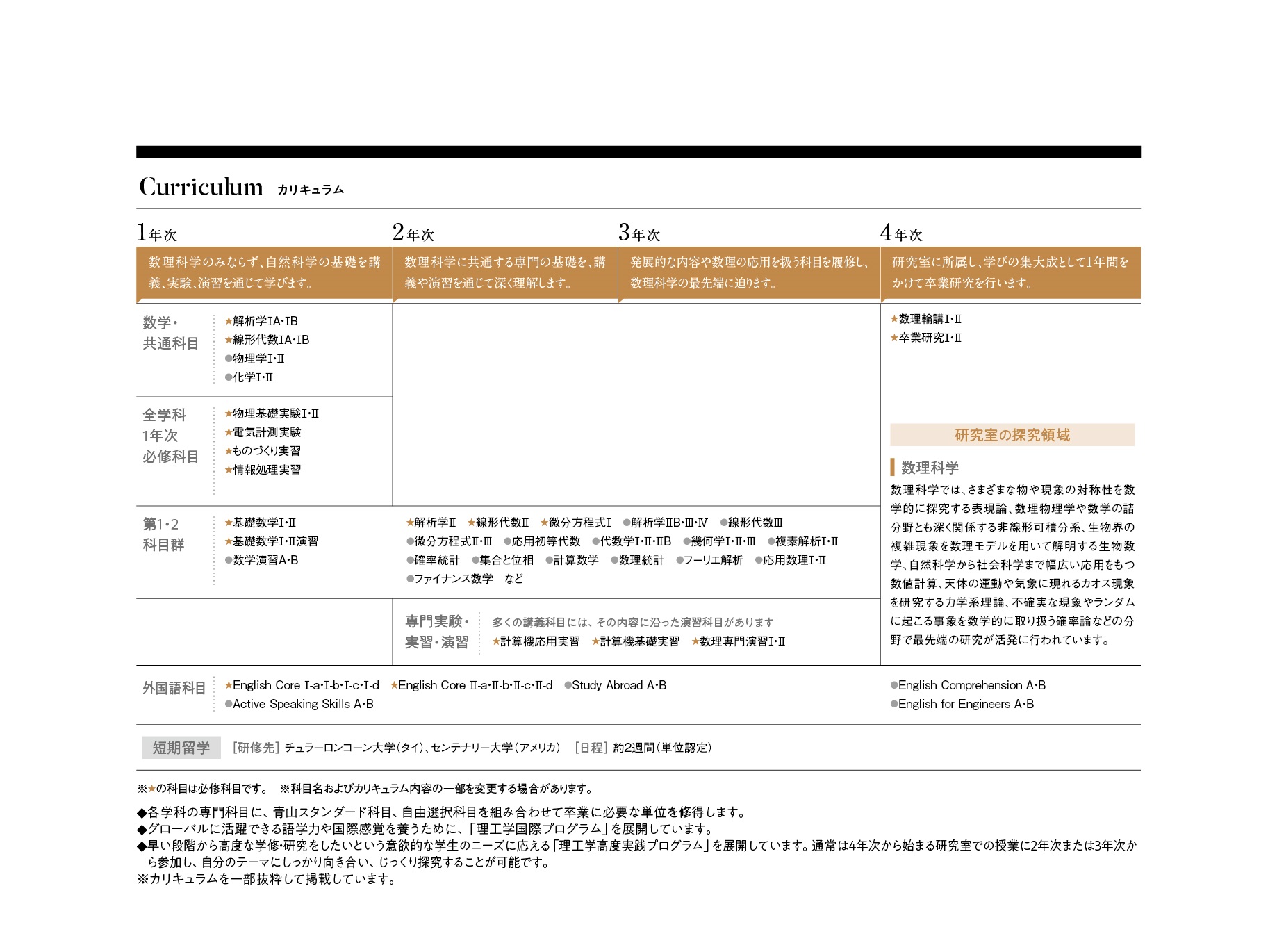- 2025年度 授業要覧 理工学部
学びの特色とカリキュラム(数理サイエンス学科)
※ここで紹介する履修モデルは、あくまでも一例です。
COURSE FEATURES 主要科目の特長
数理サイエンス学科
| 科目名 | 特長 |
|---|---|
|
代数学Ⅰ
|
群とは、図形、方程式、空間などの対称性を数学的に記述する代数系である。本講義では、代数学の初歩を学んだ学生を対象に、群論の基礎について解説する。豊富な具体例を扱うことで理解を深めた上で、代数学の抽象的な議論に慣れることが目標である。
|
|
幾何学Ⅰ
|
微分幾何学とは、微分・積分を用いて図形が持つ性質を解析する学問である。本講義は、微分幾何学の入門として、3次元空間内の曲線と曲面を扱う。曲率、基本形式などを主題材として扱った上で、外微分形式やリーマン計量についても解説する。
|
|
微分方程式Ⅱ
|
理工学の多くの分野において、基礎となる法則の多くは偏微分方程式の形で与えられる。本講義では、熱方程式、ラプラス方程式、波動方程式といった、応用上重要な線形偏微分方程式について、解析手法および解の性質について解説する。また、非線形問題についても簡単な説明を加える。
|
理工学部共通
| 科目名 | 特長 |
|---|---|
|
English CoreⅠ-a
|
主に英語のリーディング力並びにリスニング力向上を目指す。リーディング力としては、日常的に非常によく使用される表現で書かれた比較的短く簡潔なテキストを読み、内容を理解することができる力の獲得を目指す。また、リスニング力としては、はっきりとゆっくりとした発話・発音であれば、具体的な必要性を満たすことができる程度に理解できる力を養成する。
|
|
English CoreⅠ-b
|
英語の読解力と作文力を伸ばすことを目的とする。文章構成を理解し、内容を正確に読み取り、要約する力を養っていく。特に筆者の姿勢や視点が出ている記事や報告文が正確に読めるようになることを目標とする。また、関心ある話題についてつながりのあるテクストが書ける力を高めていく。正確な読解力・作文力のために、語彙・文法・句読法も取り上げる。
|
|
English CoreⅠ-c
|
英語のリスニングとスピーキング力を伸ばすことを目的とする。ゆっくりと明瞭に話された言葉を理解し、自分自身や自分の家族・学校・地域などの身の回りの事柄に関連した句や表現が把握できる力を養っていく。また、簡単な英語で意見や気持ちを伝達し、賛成や反対などの意見を表現し、類似点や相違点を表すことができるようになることを目指す。
|
|
English CoreⅠ-d
|
趣味や好き嫌いについて複数の文を用いて、簡単な語や基礎的な表現を使って書いたり、話したりすることができる。自分の経験について辞書を用いて、短い文章を書いたり、話したりすることができる。前もって発話することを用意した上で、日常生活に関する簡単な事実を、簡単な語や基礎的な句を限られた構文を用い、複数の文で描写できる。
|

